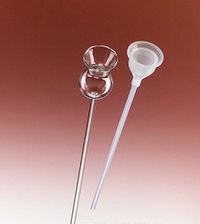Thistle tube
 |
This article is a stub. Please help Sciencemadness Wiki by expanding it, adding pictures, and improving existing text.
|
A thistle tube or thistle funnel, is a piece of laboratory glassware consisting of a shaft of tube, with a reservoir and funnel-like section at the top, which are often used by chemists to add liquid to an existing system or apparatus, often through a hole in a stopper.
Contents
General
A Thistle tube consists of a long borosilicate glass or plastic tube with a small bulb with funnel shape at the top. Liquids are poured in the bulb section and then are allowed to freely flow in the flask.
Since they're meant to handle liquids, thistle tubes do not have ground glass joints. Glassware similar to thistle tubes but with female ground glass joints are called gas inlet tubes and, as their name suggests, are used to inject gases in flasks rather than liquids.
Availability
Thistle tubes can be bought online or from lab suppliers.
DIY thistle tube
You can make a crude thistle tube by taking a bulb pipette and cutting it at the level of the bulb, around 3/4 of the bulb height. If you know how to work with glass, you can use a gas torch to soften the upper part of the cut bulb to carefully deform it and make a small funnel, though this is not always required, as some thistle tube models are just funnels with really long stems.
For plastic thistle tubes, take a small plastic funnel and glue it to a long rigid plastic tube.
